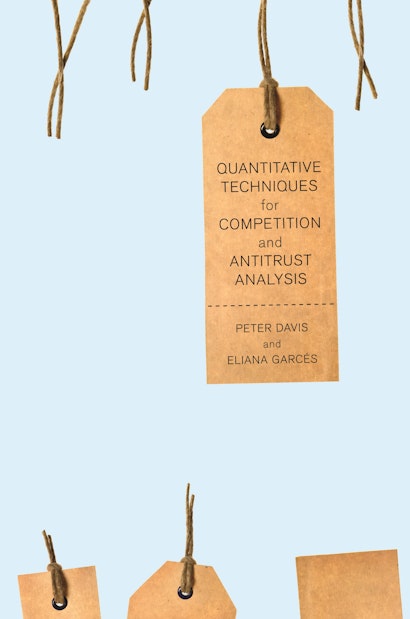This book combines practical guidance and theoretical background for analysts using empirical techniques in competition and antitrust investigations. Peter Davis and Eliana Garcés show how to integrate empirical methods, economic theory, and broad evidence about industry in order to provide high-quality, robust empirical work that is tailored to the nature and quality of data available and that can withstand expert and judicial scrutiny. Davis and Garcés describe the toolbox of empirical techniques currently available, explain how to establish the weight of pieces of empirical work, and make some new theoretical contributions.
The book consistently evaluates empirical techniques in light of the challenge faced by competition analysts and academics—to provide evidence that can stand up to the review of experts and judges. The book’s integrated approach will help analysts clarify the assumptions underlying pieces of empirical work, evaluate those assumptions in light of industry knowledge, and guide future work aimed at understanding whether the assumptions are valid. Throughout, Davis and Garcés work to expand the common ground between practitioners and academics.
Peter Davis is deputy chairman of the United Kingdom's Competition Commission. He previously served on the faculties of MIT Sloan and the London School of Economics. He holds a PhD in economics from Yale University. Eliana Garcés is a member of the cabinet of the European Commissioner for Consumer Affairs. She was previously a member of the Chief Economist's Team within the European Commission's Directorate General for Competition. She holds a PhD in economics from the University of California, Los Angeles.
"This book will be eminently helpful to both the practitioner with an undergraduate background in economics and to the academic economist. It offers the practitioner a clear and concise rendering of the techniques used in antitrust analysis. It offers the academic an explanation of the issues that arise in antitrust cases and the institutional setting in which they are analyzed."—Ariel Pakes, Harvard University
"An excellent and wide-ranging introduction to the new econometric literature that has played an increasingly important role in competition policy over the past decade."—John Sutton, London School of Economics and Political Science
"Davis and Garcés have filled a longstanding gap in the market with their detailed overview of modern empirical research in industrial organization. Their book would be an excellent text for a graduate class in empirical industrial organization. More generally, the authors provide a comprehensive introduction to the field."—Robert Porter, Northwestern University
"There is no other book like this on the market. The authors provide essential guidance for skilled antitrust practitioners who want to learn up-to-date empirical methods. The comprehensive body of material, skillfully explained, will also be of great use to graduate students and academics who want to explore the intersections of policy and econometric practice."—Steven Berry, Yale University
"This book provides a comprehensive overview of quantitative techniques used in competition analysis, ranging from very simple methods when limited data are available to the most advanced and state-of-the-art techniques. It fills important gaps because no other recent book combines insights from empirical industrial organization and quantitative competition policy analysis. There is also a very good mix between discussion of techniques and cases. Although its primary audience is practitioners at competition policy authorities, it will also interest academics and consultants and can serve as a textbook for advanced masters and PhD courses."—Frank Verboven, Katholieke Universiteit Leuven
"This very useful book is a great addition to the discipline. Applied industrial organization is a rapidly developing field, with many open areas and problems, but practitioners are often forced to work with what is available to make antitrust decisions. A good user's manual like this one is important to have. I am sure practitioners will find this a handy toolbox."—Maarten Pieter Schinkel, University of Amsterdam

